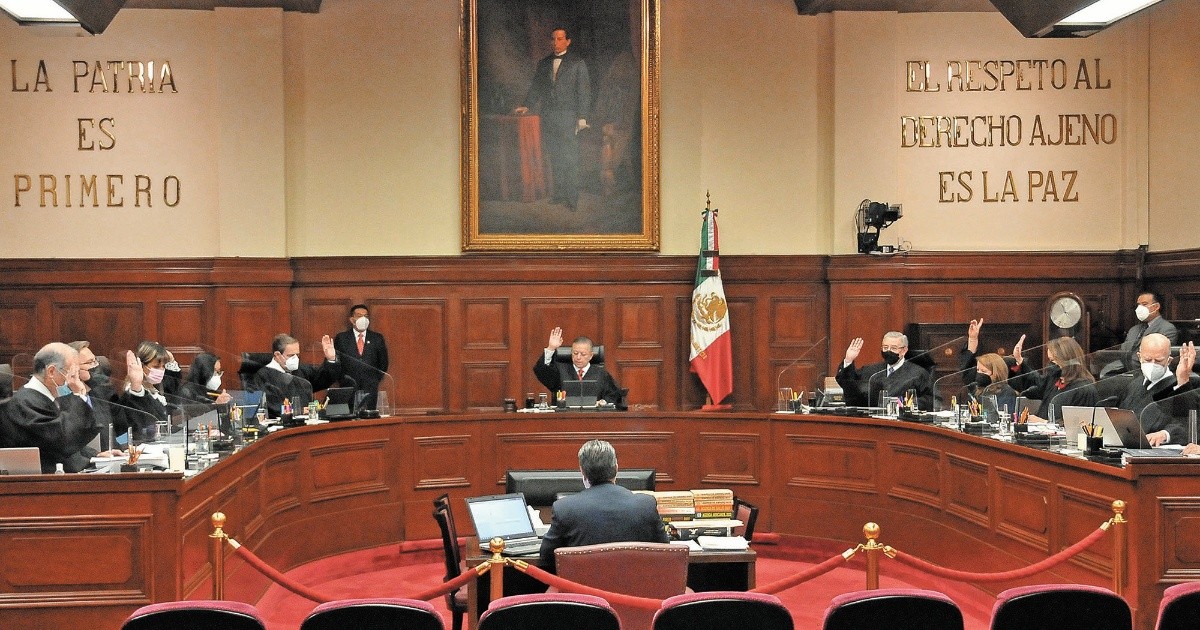Although a majority of seven ministers voted for its unconstitutionality, the plenary session of the Supreme Court of Justice of the Nation (SCJN) validated the reform to the Electricity Industry Law (LIE) promoted by President Andrés Manuel López Obrador to privilege the Federal Electricity Commission (CFE) in the dispatch of electrical energy.
The mechanism for dispatching energy from power plants will continue to be in force, so the National Center for Energy Control (Cenace) will give priority to CFE plants. The dispatch will continue, in that order: to the hydroelectric plants; central of the CFE; to wind and solar energy for individuals and finally to combined cycle plants. It is maintained that Clean Energy Certificates can be granted to any energy producer, regardless of whether the plants where they are generated are new or old.
A price tariff system is also guaranteed that will be updated due to inflation through the operation of power plants regulated by the CFE Legacy Contract and the Contract for the Physical Delivery of Energy and Capacity to the Network. It is also maintained that it is not obligatory to buy by auctions for the supplier of basic services.
Amparos can continue
The reform to the LIE will remain in force as it has not reached jurisprudence in the SCJN, although the specialized judges and collegiate circuit courts will have freedom of jurisdiction to resolve the appeals under review as they deem appropriate, without being tied to the reasoning of the simple majority. of the Supreme Court.
This implies that the federal government still requires the constitutional reform that is currently being ruled in the Chamber of Deputies, since the electrical norm, although in force, can be challenged.
In a five and a half hour session, the plenary session of the Court definitively resolved the unconstitutionality action 64/2021 promoted by opposition senators who argued that the norm was contrary to free competition, prevented progress towards clean energy and was going against the T-MEC trade agreement between Mexico, the United States and Canada.
Four ministers (Juan Luis González Alcántara Carrancá; Yasmín Esquivel Mossa; Alfredo Gutiérrez Ortiz Mena and Loretta Ortiz Ahlf) voted to endorse the project of Minister Loretta Ortiz, who stated that the challenged reforms do not violate the content of articles 14,16 , 25, 26, 27 and 28 constitutional.
Only Minister Norma Lucía Piña openly voted against the project. The rest of the ministers: Arturo Zaldívar; Ana Margarita Ríos Farjat; Jorge Mario Pardo Rebolledo; Javier Laynez Potisek; Luis María Aguilar and Alberto Pérez Dayán voted in favor of some articles and against others.
The plenary session of the Court declared the constitutionality of article 3 of the LIF, sections XII, XII bis and XIV; article 4 section I; article 35 and article 108 section V. Meanwhile, in articles 3 section V; article 4 section VI; 26; 53 and 101 and 108 section VI were dismissed as they did not reach the qualified majority, so they will continue to be in force.
The SCJN determined that in actions of unconstitutionality only direct violations of the General Constitution and human rights recognized in international treaties can be asserted, for which reason the contested norms cannot be analyzed in light of the TIPAT or the TEMEC, as they do not contain human rights standards.
Environment
Regarding environmental matters, a majority ruled for the validity of articles 3, sections V, XII, XII bis, XIV; 4, section I and 108, section V, in light of the right to a healthy environment, recognized in article 4 of the Constitution and the international commitments of the Mexican State in the UN Framework Convention on Climate Change and the Paris Agreement, materialized in the General Law on Climate Change, which binds it to reduce the emission of greenhouse gases, through the substitution of energies from fossil sources with renewable ones.
The highest court recognized the validity of section I of article 12 of the Electricity Industry Law, estimating that the duty of the CRE to consider the planning criteria to grant permits does not harm its autonomy.
Renegotiation of contracts
By a majority of nine votes, the plenary session of the Court declared constitutional the fifth transitory article of the reforms to the Law of the Electricity Industry that allows the government of President Andrés Manuel López Obrador to review, renegotiate or terminate in advance the Commitment Contracts of Electric Power Generation Capacity and Purchase and Sale of Electric Power signed with independent power producers.
This was one of the main motivations for the preferential initiative that President López Obrador presented to the Congress of the Union in February 2021, since in his opinion they were “leonine contracts” that benefited individuals and harmed the Federal Commission of Electricity (CFE). For their part, companies in the sector consider that this places them in a situation of legal insecurity.
Said transitory establishes that “the Contracts for the Commitment of Electric Power Generation Capacity and the Purchase and Sale of Electric Power signed with independent power producers under the Law of the Public Service of Electric Power, must be reviewed in order to guarantee their legality and the compliance with the profitability requirement for the federal government (…) Where appropriate, said contracts must be renegotiated or terminated in advance”.
In the opinion of the high court, it is not contrary to the principle of retroactivity, because “it is not possible to indicate that acquired rights have been created.”
Minister Yasmín Esquivel Mossa defended the revision of the contracts, as she said that “it led to the violation of the purposes inherent in the law of the public service of electricity, as well as to distort the contractual legal essence and cause serious damage to the patrimony of the CFE ”.
Regarding the issue of self-supply permits, the ministers did not achieve a qualified majority in the fourth transitional article of the reform to the Law of the Electricity Industry.
The resolution of the ministers allows that amparos can still be filed against the effects of the norm, which will be resolved at the discretion of the judge who handles the case.








